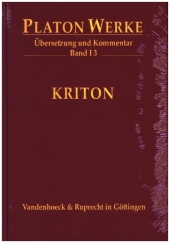 Neuerscheinungen 2016Stand: 2020-02-01 |
Schnellsuche
ISBN/Stichwort/Autor
|
Herderstraße 10
10625 Berlin
Tel.: 030 315 714 16
Fax 030 315 714 14
info@buchspektrum.de |

Wolfgang Bernard
Kriton
Herausgegeben von Bernard, Wolfgang
2016. 147 S. 242 mm
Verlag/Jahr: VANDENHOECK & RUPRECHT 2016
ISBN: 3-525-30436-6 (3525304366)
Neue ISBN: 978-3-525-30436-5 (9783525304365)
Preis und Lieferzeit: Bitte klicken
Übersetzung und Kommentar zum "Kriton" bieten eine genaue Nachzeichnung und Analyse der Argumentation. Im "Kriton" zeigt Platon, wie man methodisch sauber und philosophisch überlegt eine Frage konkreten individuellen Handelns entscheidet. Der Kommentar erschließt den Text, indem er die Argumentation detailliert erläutert. Erster wissenschaftlicher Kriton-Kommentar auf Deutsch
Philologisch präzise Übersetzung
Genaue Analyse der philosophischen und staatstheoretischen Argumentation
Platons "Kriton" spielt im Jahr 399 v.Chr. Sokrates erwartet im Gefängnis seine Hinrichtung, die sich aufgrund kultischer Verpflichtungen Athens verzögert. Sein Freund Kriton besucht ihn, um ihn zur Flucht zu bewegen. Sokrates lehnt diesen Vorschlag jedoch ab, weil auch erlittenes Unrecht nicht dazu berechtigt, selbst Unrecht zu tun. In diesem Dialog demonstriert Platon, wie man methodisch sauber und philosophisch überlegt eine Frage konkreten individuellen Handelns entscheidet. Der erstmals auf Deutsch verfasste Kommentar legt aufbauend auf einer philologisch präzisen Übersetzung besonderen Wert auf die genaue Nachzeichnung und Analyse der philosophischen einschließlich der staatstheoretischen Argumentation. Dabei diskutiert er auch Bezüge zu modernen Positionen. So geht es im "Kriton" etwa nicht um die Frage eines Widerstandsrechts, sondern darum, ob und wann man sich in einem Rechtsstaat einem letztinstanzlichen Fehlurteil widersetzen beziehungsweise entziehen darf.
First scholarly commentary in German directed at a general audience with no specialist knowledge of Ancient Greek or Ancient Philosophy. Based on a philologically precise translation the commentary delivers an accurate paraphrase and analysis of Plato´s philosophical argument, especially with regard to his political theory. Implications for present-day concepts and theories are discussed wherever possible. Central tenets of the commentary are; a) the "Crito" is not concerned with the problem whether there is a right to resist against tyranny, it debates the problem of whether it is allowable to ignore a final and binding verdict in a state governed by the rule of law in a case of wrongful conviction; b) the "Crito" underscores Socrates´ deep religous beliefs, these are not seen to contradict the rationality of his position; c) Socrates´ method, which is founded on Platonic dialectics and thus always guided by logos, is contrasted with Crito´s purely rhetorical approach; d) Socrates´ view that the only ethically acceptable decision is for him to remain in prison is based on the principle that being on the receiving end of injustice does not make it acceptable or ethically right to act unjustly yourself; e) apart from such general considerations the "Crito" demonstrates that there is simply no option left that would allow Socrates to lead a life true to himself and his personal convictions. Thus, the argument in the "Crito" is at the same time highly specific with regard to Socrates´ person and situation and a general demonstration of how Plato believes a philosophical person should go about when deciding on a course of action in a given situation.
Bernard, Wolfgang
Prof. Dr. Wolfgang Bernard ist Inhaber des Lehrstuhls für Griechische Philologie an der Universität Rostock.


